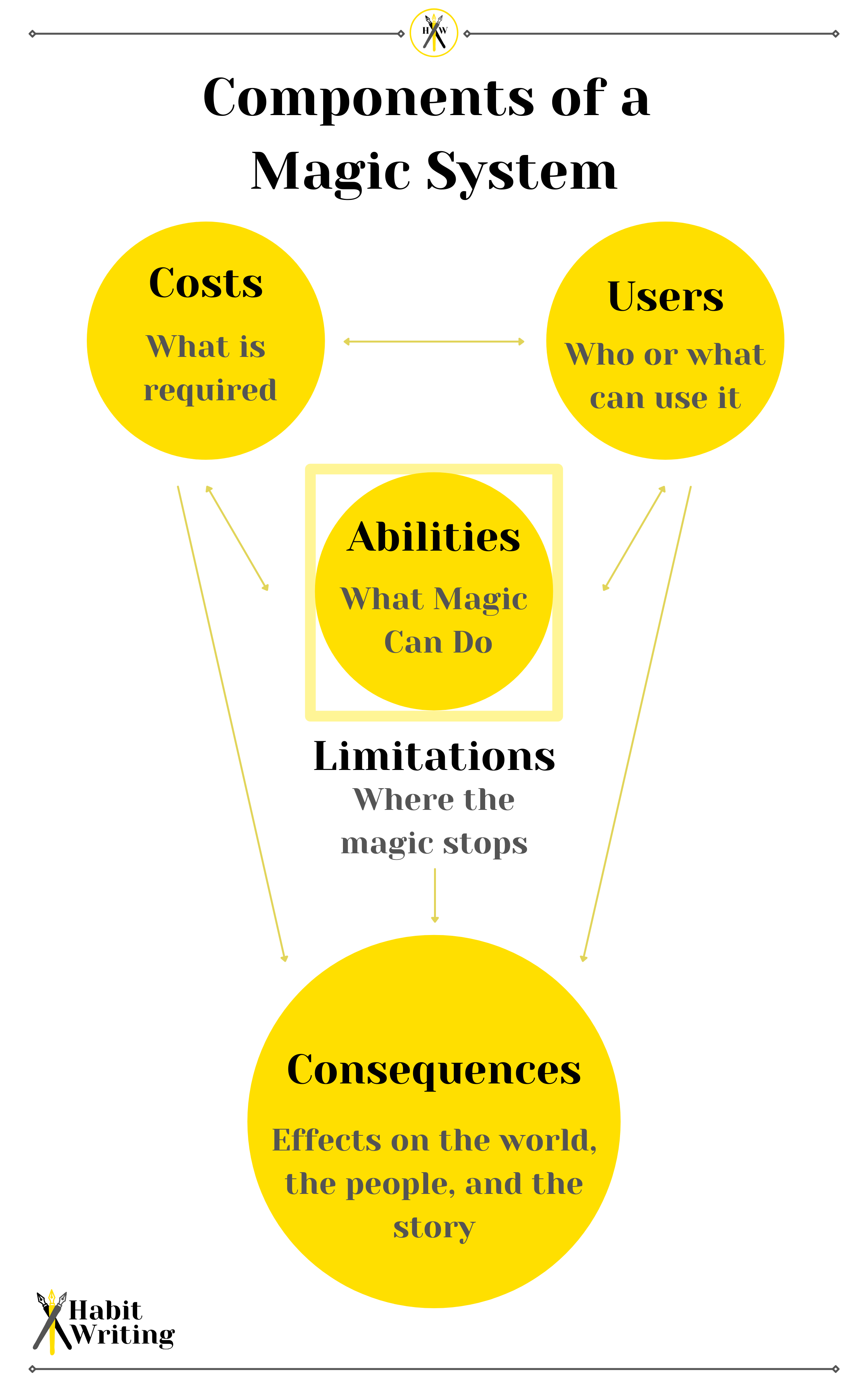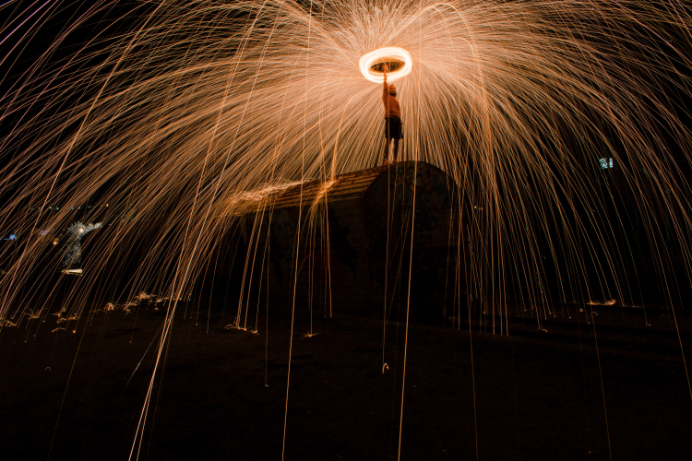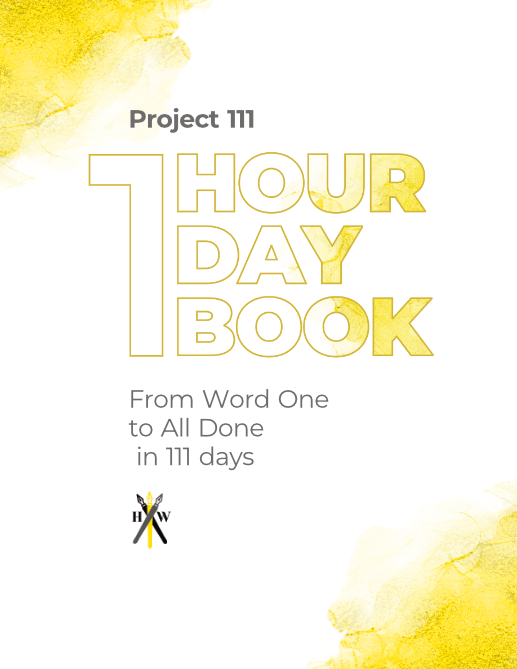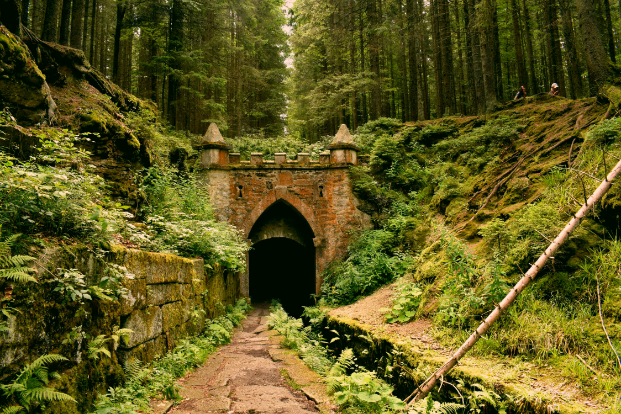You know that magic systems don’t come from, well, magic. It takes more than mystical incantations to develop something truly mystifying. It requires hard work and these 7 steps to make a magic system truly fantastic. You have the unique opportunity to create amazing magic that will enchant your readers.

1. Follow Your Inspiration
This first step may sound obvious but it can be easily overlooked. Before setting out to sketch your magic system, consider what it is that you love about your ideas. Take a minute to note what things you love most about magic in your favorite fantasy and science fiction stories. Whatever fantasy novel is your top choice probably holds something magical that you love. Dig into what that might be.
For some, your favorite magic system might include a magic-user who increases their skill level over time. Maybe you love magic when it’s crazy overpowered with a fatal flaw, elemental magic, or it’s so limited that it has very nuanced effects. Brainstorm with some unique ideas to make it your own.
Whatever series of fantasy books you love, analyze what makes those great to you and store that away as you start building things. One thing is for certain, if you love your system, you will want to keep writing the story that your magic system lives in, and your readers will want to keep reading.

2. Define Abilities and Limitations
This step will depend heavily on whether you are going with a hard magic system or a soft magic system. The essence of this distinction is that hard magic has rules and limitations defined and expressed to the reader, while a soft magic system leaves those rules and limitations fuzzy. For more information on this check out Hard Magic vs Soft Magic.
Regardless of whether your magical system is hard or soft, defining abilities, limitations, and handicaps are important facets to consider. Let’s go over each individually.
Abilities: What the magic is capable of. This obviously has a large bearing on the shape of the magic and how it interacts with the world around it. If someone is able to kill someone with a glance, then that is an important ability to note. And how that is done is important as well. If the ability to kill with a glance uses laser vision, that has a different response and approach than if it turns people to smoke and dust without warning. You can see how these abilities affect the stories that can be told, and even more importantly, the limitations of that magic.
Limitations: Where and when does the magic stop functioning? Can the laser vision be deflected? Can the smoke and dust glance penetrate armor? This is where the most interesting aspects of the magic come into play. If your magic doesn’t have limits then it can be hard to provide conflict (i.e. Superman). And according to Sanderson’s laws of magic, you should add limitations before adding more abilities. Does your magic use up a resource? Is it geologically dependent or can only be used on certain objects? When thinking of different magic systems, consider the limitations that they use and try combining or dissecting them.


Our 84-page book planner and 111 day writing course.
3. Define the Magical Costs
This one ties right into limitations, but this is a character-focused cost. What is at stake for your characters when they use the magic? What do they risk or give up?
Everything comes with a cost and so it is important to figure out what those costs are. Perhaps your cost can be time, and a spell can only be cast if it is studied sufficiently and executed perfectly. Perhaps the cost doesn’t directly affect the character but instead affects the characters or world around them.
The key to creating interesting magic systems is creating interesting decisions. If magic requires a scarce resource or perhaps costs them years of their life, how does that affect the way that they use it? There are many areas in which you can integrate interesting costs for your magic.
4. Choose Who or What Interacts with Your Magic

What are the requirements to be able to use magic? Are there people born with certain talents? Or is it something that can only be gained through study and effort (such as Sympathy in the Kingkiller Chronicle)? In what ways do animals, other sentients, or surrounding nature interact with the magic? There could be some really interesting stories written about worlds where humans are incapable of using magic. If you can tame a horse that is also a wizard, that would be a very unique magic system.
Generally, some internal logic is helpful but not always needed. It all depends on the story you are trying to tell. If the way people are “chosen” to use magic just remains a mystery, then that can definitely serve your fantasy fiction. If using some kind of logic around who and what gets to use magic, maybe your protagonist just doesn’t fit the requirements. All of this leads to very interesting ideas involving magical creatures, supernatural power, and social stratification, which are all great story fodders.
5. World-build
The best magic systems feel real and alive because they fit seamlessly into the fictional world that you have created. With what we have established thus far, consider the wider effects of what you have decided about your system. World-building can be loads of fun to explore. If people can fly in your world, what does public transit look like? If people can explode things with their minds, how can a prison be built to contain those people?

There can be a trap in world-building for the common fantasy writer, such as myself, and that trap is world-builder’s disease. It can be tempting to dig so deep into your amazing new world that you get lost. And then once you’ve deciphered just how light particles interact differently in your fantasy story, you can feel a need to share that information, even if the story you started is a mystery romance novel.
A good rule of thumb (though there are no hard and fast rules in writing) is to keep the exposition of this to a minimum. If the details of your world serve your narrative, then that’s fantastic. If something needs to be explained to avoid deus ex machina, then it should definitely be explained. But it can be dangerous to fall too deep and then drag your reader with you, risking the loss of their hard-won attention. Or worse, you spend all your time worldbuilding and never write your story!
If you’re just in it to world-build, then by all means dive as deep as you want into designing new quantum mechanics. But if you want to get your story out there someday, the lore can come later. If fans ask, you can delight them with details, but try to focus on details that serve the narrative.

6. Explore Magical Conflict
Now that you know the who and the what of your magic system, it’s time to dig into one of the most fun parts of developing magic: conflict. Depending on who is involved, what does a conflict between mages or wizards, or any other type of magic user look like? If it’s a mage vs a normal human, what does that look like? Or perhaps one person with magic versus one hundred without? Is it like Star Wars where one Jedi or sith can face off against many foes or is your epic fantasy conflict more balanced than that?
How can different abilities combine with each other? How can they undercut or undermine each other? And in what ways can this affect your main character and the story that you want to tell? If you have a soft system for your magic, it can be good to show which characters are more powerful than others through character’s reactions to them, or by showing them in conflict early on.
Whatever magical ability you are playing with, try to determine what are the most interesting conflicts that can arise from it and how those conflicts are resolved in the short-term and the long term. Magic can promote conflict beyond an individual level, blooming out to societal and national conflicts.

Just like J.K Rowling’s contrast between the wizarding world and the muggle world, magic can give way for prejudice, disdain, and even expand to war or conquest based on the differences found. How does your magic system determine the way in which resources are exchanged and managed within a society? No matter what you can find some great story fodder by exploring these conflicts in your story world.
7. Expand Your Magic
The final step is to iterate and reiterate. It’s only by spending time with what you have built that you will discover the best parts about it. Whether you chose a stricter hard magic system or a fuzzy-edged soft magic system, you will be able to surprise and astound your reader with things they couldn’t have imagined.

Be sure to take notes of your thoughts along the way, and repeat steps 1-6 to delve deeper into the amazing spells, abilities, and limitations that you have brainstormed here.
The best magic systems come from continual experimentation. You’ll find elements in your magic that will keep your story fresh and interesting and leave your readers mystified and reveling in the rich depth of your world.
Lean Into What You Love
Much like the zeroth law from Sanderson’s laws, be sure to lean into what is most awesome to you. Whatever inspires you and keeps the inspiration flowing will serve you and your story far better than mimicking the things you think magic needs to have. As with everything in writing, the best things come from following what you love about your story.
Reed Smith
Reed is the founder and builder of Habit Writing and enjoys all things writing. He loves learning about the craft of storytelling, writing messy drafts, and playing board games with his wife, friends, and family.
Our 84-page book planner and 111 day writing course.



